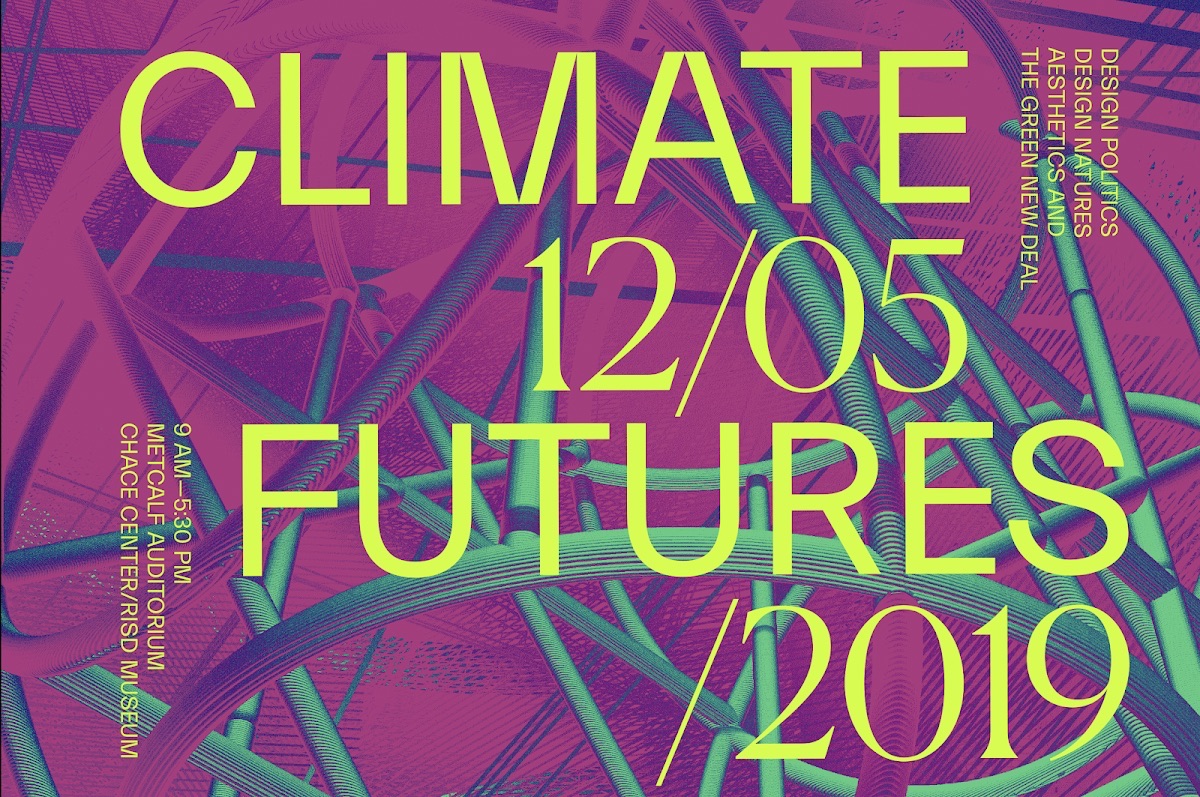Loading...
Location
Metcalf Auditorium, Chace Center, 20 North Main Street, Providence RI 02903
Event Website
https://liberalartsmasters.risd.edu/ncss/events/climate-futures-ii
Start Date
5-12-2019 2:30 PM
End Date
5-12-2019 3:50 PM
Document Type
Video
Description
Building survivable futures on a warming planet is not simply going to involve policy for a Green New Deal. Just transitions to post-carbon just futures are inevitably going to raise very significant aesthetic, political and cultural issues about the worlds that we are leaving behind and the world that we need to design and make. The Green New Deal or the just transition more broadly has developed little in the way of a new aesthetic or cultural politics. Its primary co-ordinates have been to look back to the political and public aesthetics that emerged around the first New Deal of the 1930s or turn to the aesthetic that emerged out of predominantly white US environmentalisms of the 1970s. Do we need to find other ways to “stay with the trouble” to paraphrase Donna Haraway as we try and construct survivable futures? What might a joyful, aesthetics of a just transition look like that can come to terms with the loss of certain kinds of nature-cultures, modes of valuing and modes of making and be open to the challenge of designing new cosmopolitan nature-cultures, new ways of valuing and new modes of future making? Can we envisage an aesthetic and cultural politics that reclaims low carbon pleasures present in everyday life? Does a progressive cultural politics for a just transition require a broader decentering of Eurocentric or US centric environmental aesthetics and a more sustained engagement with the insights of decolonial, Latinx, post humanist, cosmopolitical and other currents? In this panel we ponder the kinds of liberatory aesthetics and cultural politics that could underpin the just transition and offer solidarity and hope across borders and boundaries.
Sponsored by the Division of Experimental and Foundation Studies, Rhode Island School of Design
File Type
mp4
Run Time
1 hr 24 min 45 sec
Speakers
Chair: Paula Gaetano Adi (Division of Experimental & Foundation Studies, Rhode Island School of Design)
Speakers
- Yuriko Saito (Nature-Culture-Sustainability Studies Program, History-Philosophy-Social Sciences Department, Rhode Island School of Design) “Environmental Aesthetics and Everyday Life”
- Anastasiia Raina (Graphic Design Department, Rhode Island School of Design ) “Cyborg Ecology for the Green New Deal”
- Priscilla Ybarra (English Department, University of North Texas) “Latinx Environmentalisms: Place, Justice, and the Decolonial”
Discussant: Nicholas Pevzner (Landscape Architecture Department, University of Pennsylvania)
Climate Futures 2 | Design Politics, Design Natures, Aesthetics and the Green New Deal, Session 4: Liberatory Aesthetics for a Just Transition?
Metcalf Auditorium, Chace Center, 20 North Main Street, Providence RI 02903
Building survivable futures on a warming planet is not simply going to involve policy for a Green New Deal. Just transitions to post-carbon just futures are inevitably going to raise very significant aesthetic, political and cultural issues about the worlds that we are leaving behind and the world that we need to design and make. The Green New Deal or the just transition more broadly has developed little in the way of a new aesthetic or cultural politics. Its primary co-ordinates have been to look back to the political and public aesthetics that emerged around the first New Deal of the 1930s or turn to the aesthetic that emerged out of predominantly white US environmentalisms of the 1970s. Do we need to find other ways to “stay with the trouble” to paraphrase Donna Haraway as we try and construct survivable futures? What might a joyful, aesthetics of a just transition look like that can come to terms with the loss of certain kinds of nature-cultures, modes of valuing and modes of making and be open to the challenge of designing new cosmopolitan nature-cultures, new ways of valuing and new modes of future making? Can we envisage an aesthetic and cultural politics that reclaims low carbon pleasures present in everyday life? Does a progressive cultural politics for a just transition require a broader decentering of Eurocentric or US centric environmental aesthetics and a more sustained engagement with the insights of decolonial, Latinx, post humanist, cosmopolitical and other currents? In this panel we ponder the kinds of liberatory aesthetics and cultural politics that could underpin the just transition and offer solidarity and hope across borders and boundaries.
Sponsored by the Division of Experimental and Foundation Studies, Rhode Island School of Design
https://digitalcommons.risd.edu/liberalarts_climatefutures/climatefutures2019/climatefutures2019symposium/5

